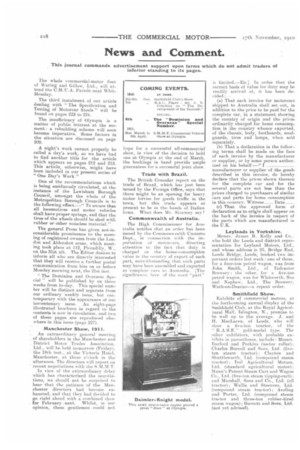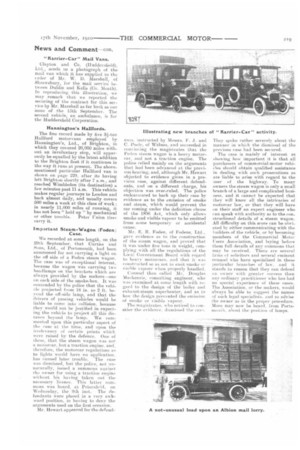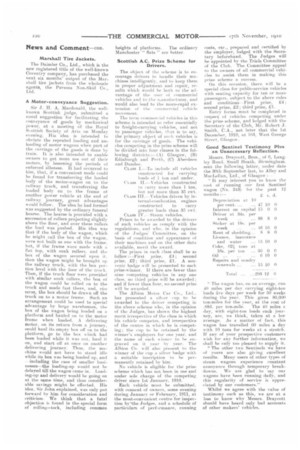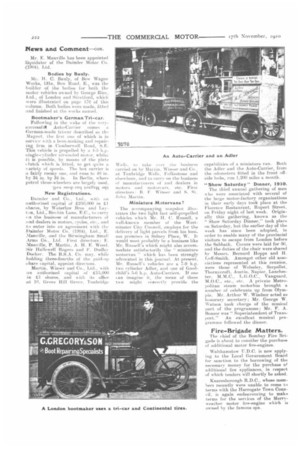News and Comment.
Page 10

Page 11

Page 12

Page 14

If you've noticed an error in this article please click here to report it so we can fix it.
This journal commands advertisement support upon terms which do
not admit traders of
inferior standing to its pages.
The whole conamercial-motor fleet of Waring and Gillow, Ltd., will attend the C.M.U.A. l'arade next White Monday.
The third instalment of our article dealing with "The Specification and Testing of Motorcar Steels " will be found on pages 223 to 224.
The insufficiency of Olympia is a matter of public interest at the moment: a rebuilding scheme will soon become imperative. Some factors in the situation are discussed on page 209.
A night's work cannot properly be called a day's work, so we have had to find another title for the article which appears on pages 212 and 213. This article, otherwise, might have been included in our present series of "One Day's Work."
One of the recommendations which is being assiduously circulated, at the instance of the Lewisham Borough Council, amongst the whole of the Metropolitan Borough Councils is to the following effect;—" To secure that all locomotives and motor vehicles shall have proper springs, and that the tires of the wheels should be shod with rubber or other noiseless material."
The general Press has given not-inconsiderable prominence to the meeting of registered owners from the London and Aldershot areas, which meeting took place at 112, Piccadilly, W., on the 31st ult. The Editor desires to inform all who are directly interested that they will receive a further postal communication from him on or before Monday morning next, the 21st inst.
" The Dominion and Overseas Special " will be published by us three weeks from to-day. This special number will be distinct and separate from our ordinary weekly issue, but contemporary with the appearance of our tercentenary issue. An eight-page illustrated brochure in regard to the contents is now in circulation, and two of these pages are reproduced elsewhere in this issue (page 227).
Manchester Show, 1911.
An extraordinary general meeting of shareholders in the Manchester and District Motor Trades Association. Ltd., will be held to-morrow (Friday). the 18th inst., at the Victoria Hotel, Manchester, at three o'clock in the afternoon. The directors will report on recent negotiations with the S.M.M.T.
In view of the extraordinary delay which has characterized the negotiations, we should not be surprised to hear that the patience of the Manchester directors had become exhausted, and that they had decided to go right ahead with a combined show for February • next. Whilst, in our opinion, the,se gentlemen -could not hope for a successful all-commercial show, in view of the decision to hold one at Olympia at the end of March, the bookings in hand provide ample guarantees for a successful joint show.
Trade with Brazil.
The British Consular report on the trade of Brazil, which ha,s just been issued by the Foreign Office, says that there might be an opening for heavy motor lorries for goods traffic in the town, but this trade appears at present to he in the hands of Italian firms. What does Mr. Sturmey say?
Commonwealth of Australia.
The High Commissioner for Australia notifies that an order has been issued by the Commonwealth Customs Dept., in connection with the importation of motorcars, directing attention to the fact that duty is charged on the home-consumption value in the country of export of each part, notwithstanding that such parts may have beer] assembled and exported as complete cars to Australia. [The significance, here of the word "part"
ii linnite.d.—ED.] In order that the correct basis of value for duty may be readily arrived at, it has been decided
(a) That each invoice for motorcars shipped to Australia shall set out, in addition to the price to be paid for the complete car, in a statement showing the country of origin and the prices ordinarily charged for home consumption in the country whence exported, of the chassis, body, footboards, mudguards, tires and lamps, when sold separately.
(b) That a declaration in the following terms shall be made on the face of each invoice by the manufacturer or supplier, or by some person author
ized on his behalf :—" I manufacturer or supplier of the goods described in this invoice, do hereby declare that the prices shown thereon for the complete car and for the several parts are net less than the prices charged to purchasers of similar cars and parts for home consumption in this country. Witness Date (c) That the approved form of declaration as to origin shall appear on the back of the invoice in respect of the parts which are manufactured in the U.K.
Leylands in Yorkshire. Messrs. James R. Kelly and Co., who hold the Leeds and district representation for Leyland Motors, Ltd., and whose address is 25, Bridge End, Leeds Bridge, Leeds, booked two important orders last week : one of those, for a four-ton petrol wagon, was from John Smith, Ltd., of Tadeaster Brewery : the other, for a five-ton petrol wagon, was for Whitworth, Sou and Nephew, Ltd., The Brewery. Wath-on-Dearne—a repeat order.
Smithfield Show.
Exhibits of commercial motors, at the forthcoming annual display of the Smithfield Club, at the Royal Agricultural Hall, Islington, N., promise to he well up to the average. J. and El. MacLaren, of Leeds, who will show a five-ton tractor, of the " R.A.S.E." gold-medal type. The other exhibitors, with probable exhibits in parentheses, include: Messrs. Barford and Perkins (motor roller); Charles Burrell and Sons, Ltd. (fiveton steam tractor); Clayton and Sh uttl eworth , Ltd. (compound steam tractor) ; Ivel Agricultural Motors. Ltd. (standard agricultural motor); Mann's Patent Steam Cart and Wagon Co., Ltd. (five-ton steam tipping-cart); and Marshall. Sons and Co., Ltd. (oil tractor); Wallis and Steevens, Ltd. (compound steam traebor);. Aveling and Porter, Ltd. (compound steam tractor and three-ton rubber-tired steam wagon); Garrett and Sons, Ltd. (not yet advised). "Karrier-Car" Mail Vans.
Clayton and Co. (Huddersfield), Ltd., sends us a photograph of the mail van which it has supplied to the crder of Mr. W. D. Marshall, of Shrewsbury, for the mail service between Dublin and Kells (Co. Meath). In reproducing this illustration, we may remark that we reported the securing of the contract for this service by Mr. Marshall as far back as our issue of the 15th September. The second vehicle, an ambulance, is for the Huddersfield Corporation.
Hannington's Hallfords.
The fine record made by five 3i-ton HaIlford motorvans employed by Hannington's, Ltd., of Brighton, in which they covered 20,000 miles without an involuntary stop, will apparently be equalled by the latest addition to the Brighton fleet if it continues in the way it runs at present. The abovementioned particular HaIlford van is shown on page 229, after its having left Brighton shortly after 7 a.m., and reached Wimbledon (its destination) a few minutes past 11 a.m. This vehicle makes regular journeys to London and back almost daily, and usually covers 500 miles a week at this class of work ; in nearly 11,000 miles of running, it has not been "held up "by mechanical or other trouble. Peter Union tires carry it.
Important Steam-Wagon (Foden)
Case.
We recorded at some length, on the
29th September, that Curtiss hnd Sons, Ltd., of Portsmouth, had been summoned for not carrying a light on the off side of a Foden steam wagon. The case was of exceptional interest, because the wagon was carrying two headlamps on the brackets which are always provided by the makers—one on each side of the smoke-box. It was contended by the police that the vehicle projected from 18 in. to 2 ft. beyond the off-side lamp, and that the drivers of pas.sing vehicles would he liable to come into collision, because they would not be justified in expecting the vehicle to project all this distance beyond the lamp. We commented upon this particular aspect of the case at the time, and upon the irrelevancy of certain points which were raised by the defence. One of these, that the steam wagon was not
motorear, hut a traction engine, and, therefore, the motorcar regulations as to lights would have no application. has caused' later trouble. The ease was dismissed, but the police, not unnaturally, issued a summons against the owner for using a traction engine without his haying taken out the necessary licence. This latter summons was heard, at Petersfield, on Wednesday, the 9th inst. The defendants were placed in a very awk ward position, in having to deny the arguments used on the first occasion. Mr. Hewart appeared for the defend ants, instructed by Messrs. F. J. and C. Poole, of Widnes, and succeeded in convincing the magistrates that the Foilett steam wagon is a heavy motorcar, and not a traction engine. The police relied mainly on the arguments that. had been advanced at the previous hearing, and, although Mr. Hewart objected to evidence given in a previous ease, against different defendants, and on a different charge, his objection was over-ruled. The police endeavoured to back up their case by evidence as to the emission of smoke and steam, which would prevent the car coming under the definition clause of the 1806 Act, which only allows smoke and visible vapour to be emitted from some temporary or accidental cause.
Mr. E. R. Foden, of Fodens, Ltd.. gave evidence as to the construction of the steam wagon, H11 d proved that it was under five tons in weight, complying with all the regulations of the _Local Government Board with regard to heavy motorcars, and that it was constructed so as not to emit, smoke or
vapour when properly handled.
Counsel then called Mr. Douglas Mackenzie, consulting engineer, who was examined at some length with regard to the design of the boiler and exhanst-steam superheater, and as to how the design prevented Om emission of smoke or visible vapour.
The magistrates, who retired to consider the evidence, dismissed the ,as.. They spoke rather severely about the manner in which the dismissal of the previous case had been secured.
The case is mainly of interest as showing how important it is that all purchasers of commercial-motor vehicles should obtain qualified assistance in dealing with .snch prosecutions as are liable to arise with regard to the ulcer of the highway. To many owners the steam wagon is only a small branch of a large and complicated business, and it cannot be expected that they will know all the intricacies of motorcar law, or that they will have on their staff an expert engineer who can speak with authority as to the constructional details of a steam wagon. All difficulty on this score can be obviated by either communicating with the builders of the vehicle, or by becoming members of the Commercial Motor Users Association, and laying before them full details of any summons that may be received. There are several firms ef solicitors and several eminent counsel who have specialized in these particular branches of law, and it stands lo reason that they can defend an owner with greater success than any ordinary practitioner who has had no special experienee of these eases. The Association, or the makers, would always be able to suggest the names of such legal specialists, and to advise the owner as to the proper procedure. More may now be heard, -from Portsmouth. a hoot the position of lamps. Marshall Tire Jackets.
The Daimler Co., Ltd., which is the new registered title of the well-known Coventry company, has purchased the next six months output of the Marshall tire jackets from the wholesale agents, the Parsons Non-Skid Co., Ltd.
A Motor-conveyance Suggestion.
Sir J. H. A. Macdonald, the wellknown Scottish judge, submitted a novel suggestion for facilitating the conveyance of goods by mechanical power, at a meeting of the Royal Scottish Society of Arts on Monday evening. His idea is intended to obviate the repeated loading and unloading of motor wagons when part of the carriage of the goods is done by train. It is also intended to enable owners to get more use out of their motors, by lessening the periods of enforced idleness. It had occurred to him, that, if a convenient mode could he found for transferring the loaded body of the motor-wagon on to the railway truck, a.nd transferring the loaded body on to the frame of another power vehicle at the end of railway. journey, great advantages would follow. The idea. he had formed was suggested by the ordinary funeral hearse. The hearse is provided with a succession of -rollers projecting slightly above the floor, and over these rollers the load was pushed. His idea was that if the body of the wagon, which he might call the box of the wagon, were not built as one with the frame, but, if the frame were made with a flat top, with sunk rollers, and the box of the wagon secured upon it. then the wagon might he brought lip the railway truck, with the box portion level with the floor of the truck. Then, if the truck floor were provided with similar sunk rollers, the box of the wagon could be rolled on to the truck and made fast there, and, vice versa, the box should be drawn off the truck on to a motor frame. Such an arrangement could be used to special advantage by large warehouses, the box of the wagon being loaded on a platform and hauled our to the motor frame when loaded. A delivering motor, on its return from a journey, could haul its empty box off on to the platform, go to the box which had been loaded while it was out, haul it on, and start off at. once on another delivering journey. Thus, the machine would nothave to stand idle while its box was being loaded up, and ....including the ease of smaller businesses—the loading-up would not he delayed till the wagon came in. Loading-up and delivery would be going on at the same time, and thus considerable savings might be effected. His idea, Sir John explained, was only put forward by him for consideration and criticism. We think that a fatal objection is found in the special form of rolling-stock, including common
heights of platforms. The ordinary Manchester " flats " are better.
Scottish A.C. Prize Scheme for Drivers.
The object of the scheme is to encourage drivers to handle their machines intelligently, and to keep them in proper adjustment and repair, results which would be both to the advantage of the user of commercial vehicles and to _the manufacturer, and would also load to the more-rapid extension of the Mtn mervial vehicle movement.
The term commercial vehicles in this scheme is intended to refer essentially to freight-carrying vehicles, and not to passenger vehicles, that is to say, the primary object of such vehicles is for the carriage of goods. The vehicles competing in the prize scheme will be divided into four classes in the following districts :—(A) Glasgow, (B) Edinburgh and Perth, (C) Aberdeen and Dundee.
CLASS include all vehicles construeted for carrying loads of 1 ton and under. Ass IL—Vehicles constructed to carry more than 1 ton, lint not more than 35 cwt. CLASH ITT--Vehicles driven by internalesunbustion engines constructed to carry greater loads than 3:5 cwt. CLASS W.Steam vehicles. Prizes to be awarded to the drivers of such vehicles as comply with the regulations. and who, in the opinion of the Judges' Committee, on the basis of condition and appearance of their machines and on the other data available, merit the award.
The prizes in each class shall be as
follow :—First prize, 4; second prize, £2; third prize, £1. A souvenir badge will be presented to each prize-winner. If there are fewer than nine competing vehicles in any one class, no third prize will be awarded: and if fewer than four, no second prize will he awarded.
The Albion Motor Car Co., Ltd.. has presented a silver (-up to he awarded to the driver competing in the above scheme who in the opinion of the Judges, has shown the highest merit irrespective of the class in which his vehicle competes, and irrespective of the centre in which he is competing; the cup to be retained by the winner's employers for one year, and the name of each 1% inner to he engraved on it year by year. The Albion Ce. will also present to the winner of the cup a silver badge with a suitable inscription to he permanently retained by him.
No vehicle is eligible for the prize scheme which has not, been in use and under sole charge of the competing driver sinee 1st January, 1910.
Each vehicle must be submitted, with consent of owners, some evening during January or February, 1911, at the most-convenient centre for inspection by'the Judges, and a schedule of particulars of performance, running costs, etc., prepared and certified by the employer, lodged with the Secretary beforehand. The Judges will be appointed by the Trials Committee of the Club. The Committee appeal to the owners of all commercial vehicles to assist them in making this prize scheme a success. On this occasion, there will be a special class for public-service vehicles with seating capacity for ten or more passenger, subject to the above rules and conditions—First prize, £4; second prize, £2; third prize, Li. Entry forms must he completed iu respect of vehicles competing under the prize scheme, and lodged with the Secretary of the Club, Mr. Robert J. Smith, C.A., not later that the 1st December, 1910, at 163, West George Street, Glasgow.
Good Sentinel Testimony Plus an Unnecessary Reflection.
Messrs. Draycott, Bros., of 6, Langley Road, Small Heath, Birmingham. sent the following letter, under date the 30th September last, to Alley and MacLellan, Ltd., of Glasgow
" It may interest you to know the cost of running our first Sentinel wagon (No. 243) for the past 12 months :-s. d. Depreciation at 10 per cent.. ... 47 10 0 Interest on capital 15 0 0 Driver at Us. per week ... 88 8 0 Stoker at 18s. per week ... 46 16 0 Rent of shedding... S 8 0 Licence, insurance and water ... IS 10 0 Coke, 624 tons at 16s. per ton ... 50 0 0 Oil ... • 6100 Repairs and sundry renewals ... ... 15 1,0 0
Total . .293 12 0
" The wagon has, on an average, run 40 miles per day carrying eight-ton loads five days per week for 50 weeks during the year. This gives 80,000 ton-miles for the year, at the cost of
.88d. per ton-mile. The 40 miles a day, with eight-ton loads each journey, are, we think, taken at a low average. As a matter of fact, this wagon has travelled 60 miles a day with 10 tons for weeks at a stretch. If any of your prospective customers wish for any further information, we shall be only too pleased to supply it.
" The other two Sentinels we have of yours are also giving excellent results. Many users of other types of steam wagons experience constant annoyanee through temporary breakdowns. We are glad to say our wagons have been running daily, and this regularity of service is appreciated by our customers."
Whilst we agree with the value of testimony such as this, we are at a. loss to know why Messrs. Dray colt should have heard only bad acconnts of other makers' vehicles.
Mr. E. Manville has been appointed liquidator of the Daimler Motor Co. 1'1904), Ltd.
Bodies by Bauly.
Mr. H. C. Battiy, of Bow Wagoe Works, 131a, Bow Road, E., was the builder of the bodies for both the motor vehicles owned by George Rice, Ltd., of London and Stratford, which were illustrated on page 176 of this volume. Both bodies were made, fitted end finished at the works named.
Bootmaker's German Tr-car.
Following in the wake of the veryeuccessfu'i Auto-Carrier conies e German-made tri-car described as the Magnet, the filet one of which is in service with a beot-making and repairing firm in Camberwell Road, S.E. This vehicle is propelled by a 1-5 her. eingle-cylinder air-cooled motor, whilst it is possible, by means of the plate elutch which is fitted, to get quite a satiety of speeds. The box carrier is :a fairly roomy one, and rime to 40 in. by 34 in. by 34 in. In Berlin, where petrol three-wheelers are largely used, • llee auop see earileue:
New Registrations.
Daimler and Co., Ltd., with an authorized capital of £250,000 in £.1 :shares, by Waterlow Bros. and Layton, Ltd., Birellin Lane, F..('., to carry in the businese of manufacturers of z.eid dealers in motors, eycles, etc., and to enter into an agreement with the Daimler Nlotor Co. (1904), Ltd., E. Manville, and the Birmingham Small Arms Co., Ltd. First directors: E. Manville, P. Martin, A. H. K. Wood. Sir Hallewell Rogers and F. Dudley Docker. The B.S.A. Co, may, while lliolding three-fourths of the paid-up :Aare capital, appoint direetore. Martin, Winser and Co., Ltd., with an authorized capital of Elre000 in £1 shares, and eitli its office at 10, Grove Hill Grove, Tunbridge Wells, to take over the business carried on byNlartin, Wieser and CO.. W at Tunbridge ells. Folkestone and elsewhere, and to rerry on the business of manufnmetrers of and dealers in motors iind motorcars, etc. First diredOIN 7 B. F. Winser and S. St. John Martin.
Miniature Mutorvans?
Thu aveompauying snapshot illustrates the two light fast self-propelled vehicles which.1.1r. II. C. Russell, a well-known member of the 'Westminster City Council, employs for the delivery of light parcels from his busines premises in Sidney Place, W. It would most probably he a business like Mr. Russell's whieli might also accommodate satisfaetorily the " miniature motarvan " which has been strongly advocated in this journal. At present, Mr. Russell's vehicles are a 7-9 hey. two cylinder Adler, and one of Goodchild's 5-6 lep. Auto-Carriers. If one can imagine it, the mean of these two might 1.ovrectly provide the
capabilities of a miniature van. Both the Adler and the Auto-Carrier, front the odometers fitted in the front offside hubs, run 1,200 miles a month.
"Show Saturday" Dinner, 1910.
The third annual gathering of men who were associated with several of the large motor-factory organizations in their early days took place at the Florence Restaurant, Rupert Street, on Friday night of last week. Originally this gathering, known as the " Show Saturday Dinner," took place on Saturday, but the earlier day of the week has since been adopted, in order to enable many of the provincial visitors to escape from London before the Sabbath. Corers were laid for 56, and the duties of the chair were shared by Messrs. Bernard Hopps and H. feiff-Smith, Amongst other old associations represented at this reunion, were those of Wolseley, Serpollet, Thornyeroft. Austin, Napier, Lanchester, M. M .C. L.G .0.C., Vanguard, M.O.C., etc., etc. A private Metropolitan steam motorbus brought a number of celebrants up from Olympia. Mr. Arthur W. Windsor acted as honorary secretary; Mr. George W. Watson took charge of the musical part of the programme; Mr. F. A. Bonsor was " Superintendent of Transport." An excellent musical programme followed the dinner.
Fire-Brigade Matters.
The chief of the Bombay Fire Brigade is about to consider the purchase of additional motor fire-engines. Walthamstow L.D.O. is now applying to the Local Government Board for sanction to the borrowing of the necessary money for the purchase of additional fire appliances, in respect of which tenders will shortly be asked. Knaresborough R.D.C., whose members recently were unable to come to terms with the Harrogate Town Council, is again endeavouring to make terms for the services of the Merryweather motor fire-engine which is owned by the famous spa.






















